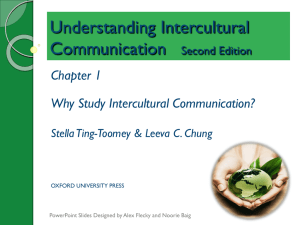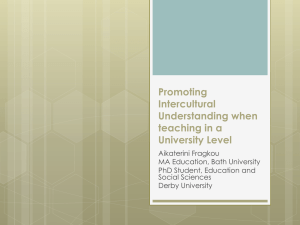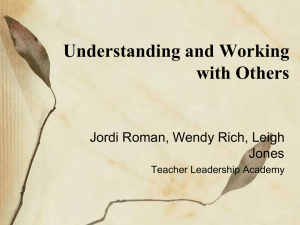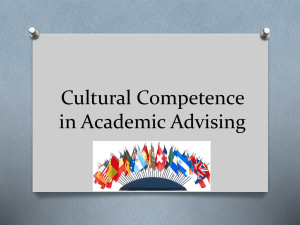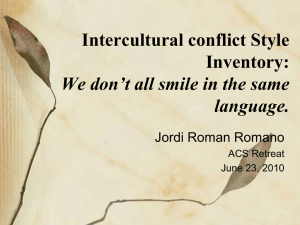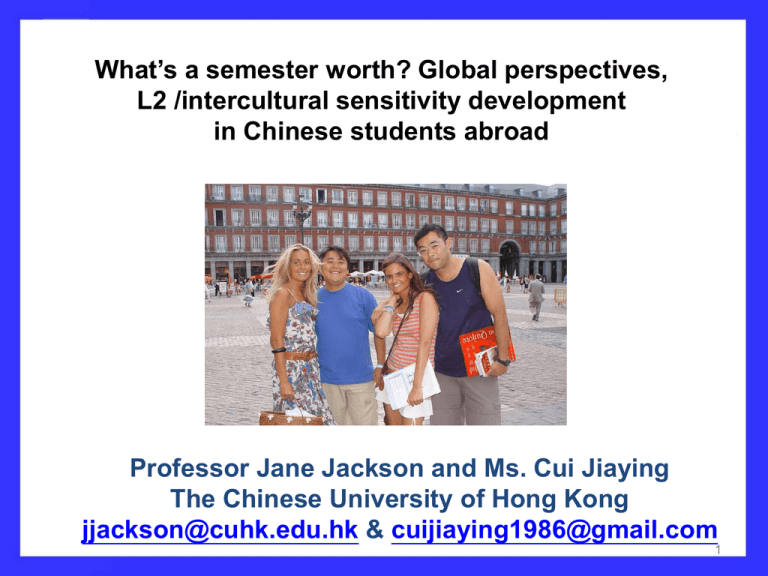
What’s a semester worth? Global perspectives,
L2 /intercultural sensitivity development
in Chinese students abroad
Professor Jane Jackson and Ms. Cui Jiaying
The Chinese University of Hong Kong
jjackson@cuhk.edu.hk & cuijiaying1986@gmail.com
1
Outline of presentation
A. Profile of home institution (CUHK)
• Mission
• Internationalization aims/Exchange quotas
B. Measuring the impact of a semester abroad
• Research design/methodology
• Findings of main study
• Experimental-Control groups
• Case studies of student sojourners
• Implications for intervention/support
2
The Chinese University
of Hong Kong (CUHK)
• A comprehensive, bilingual (Chinese-English)
research institution with ‘a global vision and a
mission to combine tradition with modernity,
and bring together China and the West’;
• One of the top 5 Univs. in Asia (QS rankings);
• 20,000+ undergraduate/postgraduate students,
including 3,000 from outside Hong Kong;
• CUHK’s internationalization aims are
embedded in the Mission Statement & 5-yr
Strategic Plans
3
CUHK’s Internationalization Strategies
• The University aims to increase the exchange
quota so that 30% of each UG cohort will go on
exchange for a semester or a year;
• In 2012-13, 877 undergraduates are taking part
in a bilateral student exchange program for a
semester or one year;
• There will be approx. 1,100 outgoing exchange
students in 2014-15 and 970 in 2015-16;
• The number of incoming exchange students will
gradually increase to 970 by 2013-14 (with
increasing diversity).
Intellectual
depth in a
specialty
Deep grasp of
Chinese
culture; sense
of national
identity & pride
Breadth in
general
knowledge
Global
perspective
Expectations
for CUHK
graduates
Intercultural
sensitivity &
appreciation of
other cultures
Bilingual
proficiency &
effective
communication
skills
Personal
attributes &
ethics: global
responsibility
Learning skills
appropriate to
the modern age
(e.g., IT)
5
Research questions relevant to
intercultural sensitivity
1. Do students who participate in a
semester-long exchange program
experience greater gains in intercultural
sensitivity, L2 confidence, and globalmindedness than peers on the home
campus?
2. Are there differential gains within groups?
What might account for this?
6
Research design
• Pre-test, post-test, mixed-method
experimental design study
– Experimental group (Undergraduates who
participated in an exchange program in the
first semester of the academic year)
– Control group (Undergraduates on campus
for the first semester prior to going on
exchange in the second semester)
7
Assessment Instruments:
Pre-test
Experimental & Control groups:
• Intercultural Development Inventory (IDI)
• Pre-Sojourn International Exchange
Survey (In-house)
• Protocol for semi-structured interview
22 students from the Experimental group were
interviewed prior to the sojourn (opportunistic
sample)
8
Assessment instruments:
Post-test
Experimental Group
Control Group
• IDI
• Post-Sojourn
International
Exchange Survey
• IDI
• Post-semester survey
• Semi-structured
interviews (The 22
participants who were
interviewed pre-sojourn
were invited to be
interviewed after their
sojourn.)
9
Data analysis
• IDI/SPSS analysis of quantitative (survey) data
• Triangulation of all elements with NVivo 10
• Content analysis of qualitative data (e.g., interview
transcripts, open-ended survey responses)
• Pre- & post- comparison of learning experience/
outcomes within and between groups (Experimental &
Control Groups)
• Preparation of full-group profiles & analysis of
individual developmental trajectories (case studies)
10
Profile of Control group (N = 141)
Sex: 85 (60.3%) female
56 (39.7%) male
Average age: 20.16 yrs. Average GPA: 3.35
Year of study
39 (27.7%) Second year 13 (9.2%) Fourth year
88 (62.4%) Third year
1 (0.7%) Postgraduate
Ethnicity: 141 (100%) Chinese
Previous travel abroad
56 (39.7%) no
85 (60.3%) yes
Previous education abroad
109 (77.3%) no
32 (22.7%) yes (typically, shortterm sojourn in Englishspeaking country)
11
Control Group (N = 141)
Area of Study
Destination (T2 2011-12)
Business admin. 81 (57.4%)
Social Science 30 (21.3%)
Arts
11 (7.8%)
Science
10 (7.1%)
Engineering
9 (6.4%)
United States
China
Canada
Netherlands
Sweden
Australia
France
Switzerland
U.K.
New Zealand
South Korea
Singapore
Other
42
21
16
14
7
6
5
5
5
3
2
2
8
(29.8%)
(14.9%)
(11.3%)
(9.9%)
(5%)
(4.3%)
(3.5%)
(3.5%)
(3.5%)
(2.1%)
(1.4%)
(1.4%)
(5.7%)
12
Profile of Expt. Group (N = 105)
Sex: 66 (62.9%) female
39 (37.1%) male
Average age: 20.74 yrs Average GPA: 3.31
Year of study:
13 (12.4%) Second year
35 (32.3%) Fourth year
56 (53.3%) Third year
1 (1%) Post graduate
Ethnicity: 105 (100%) Chinese
Previous travel abroad
43 (41.0%) no 62 (59.0%) yes
Previous education abroad
83 (79.0%) no
22 (21.0%) yes (typically, shortterm sojourn in Englishspeaking country)
13
Experimental group (105)
Area of study
Business admin.
Social Science
Arts
Science
Education
Engineering
Destination (T1 2011-12)
53 (50.5%)
20 (19%)
13 (12.4%)
10 (9.5%)
5 (4.8%)
4 (3.8%)
United States
Canada
Australia
France
South Korea
Singapore
Mexico
Denmark
Finland
New Zealand
China
UK
Other
40 (38%)
12 (11.4%)
10 (9.5%)
6 (5.7%)
6 (5.7%)
5 (4.8%)
4 (3.8%)
4 (3.8%)
3 (2.9%)
3 (2.9%)
3 (2.9%)
3 (2.9%)
6 (11.7%)
14
Findings related to
intercultural sensitivity
15
Developmental Model of
Intercultural Sensitivity (DMIS)
Denial
Inability to construe cultural difference
Defense
Other cultures are viewed as threats
Defense/Reversal
Other cultures are exalted at own culture's
expense
Minimization
Recognition of common humanity
regardless of culture; a transitional
orientation
(Transitional phase)
Acceptance
Recognition & appreciation of cultural
differences in behavior & values
Adaptation
Able to consciously shift perspective/
behavior in different cultural contexts
(Milton Bennett, 1993)
16
Pre-Test Overall IDI Profile
(Control group)
• Perceived Orientation (PO):
118.11 (Acceptance)
• Developmental Orientation (DO):
82.47 (on the Cusp of Minimization)
• Orientation Gap (OG):
36.64 - Great overestimation of intercultural competence
• Trailing Orientations (TO): All worldviews in transition
• Leading Orientations (LO): Acceptance through
Adaptation
18
Pre-Test Overall IDI Profile
(Experimental Group)
• Perceived Orientation (PO):
116.02 (Acceptance)
• Developmental Orientation (DO):
76.88 (Polarization: Defense/Reversal)
• Orientation Gap (OG):
39.14 - Great overestimation of intercultural competence
• Trailing Orientations (TO): All worldviews in transition
• Leading Orientations (LO): Minimization through
Acceptance
19
Pre-Test IDI Profiles: A comparison
of Experimental & Control Groups
Both groups were in an ethnocentric stage of
development (Control group: on the cusp of
Minimization; the Expt. Group: Polarization);
Both possessed significantly inflated opinions
about their levels of intercultural sensitivity;
Trailing issues: In both groups, all worldviews
were in transition;
The Leading Orientations (LO) were Acceptance
and Adaptation (Control group) and Minimization,
Acceptance and Adaptation (Experimental
Group).
20
Post-Test Overall IDI Profile
(Control Group)
• Perceived Orientation (PO):
117.05 (acceptance)
• Developmental Orientation (DO):
80.67 (Polarization: Defense/Reversal)
• Orientation Gap (OG):
36.38 - Great overestimation of intercultural competence
• Trailing Orientations (TO): All worldviews in transition
• Leading Orientations (LO): Minimization through
Acceptance
21
Post-Test Overall IDI Profile
(Experimental Group)
• Perceived Orientation (PO):
118.08 (Acceptance)
• Developmental Orientation (DO):
82.86 (at the Cusp of Minimization)
• Orientation Gap (OG):
35.22 (Great overestimation of intercultural competence)
• Trailing Orientations (TO): Most worldviews still in
transition; Reversal resolved
• Leading Orientations (LO): Acceptance through
Adaptation
22
A comparison of Experimental &
Control groups (IDI Outcomes)
• While the Control group regressed slightly (-1.8
points), the Experimental group shifted in the
direction of greater intercultural sensitivity
(+5.98 pts) moving into Minimization, indicating
that the semester abroad had positively
impacted on their ‘intercultural worldview’;
• Both cohorts retained a very inflation perception
of their level of intercultural sensitivity. (OG:
36.38 for Control group; 35.22 for Expt group)
Insights from
the qualitative data
Semi-structured interviews (22)
Pre-sojourn (Avg. length: 80 mins.)
Post-sojourn (Avg. length: 90 mins.)
Open-ended survey responses
24
Individuals who made the least gains in
intercultural sensitivity:
– did not have clear goals or a strategic plan for how to
optimize their stay in the host culture;
– had unrealistic expectations for their stay abroad;
– demonstrated little awareness of language- and
culture-learning strategies/ways to diversify social
networks;
– tended to spend most of their free time with
conationals (using their L1)/ interacting with friends
and family back home on SKYPE.
25
Those who made the most gains in
intercultural sensitivity:
– were more aware of strategies to employ to increase
their intercultural/L2 contact;
– formed friendships with international students (diverse)
& a few host nationals;
– were more willing to initiate interactions in their L2;
– demonstrated more understanding of the rationale
behind different practices, e.g. ‘cultures of learning’;
– became more interested in global/international affairs
(e.g., demonstrated more global-mindedness).
26
More key findings…
• Most returnees claimed that they had
become more confident in their L2 use;
• A high level of proficiency in the host
language, however, did not ensure a high
level of intercultural sensitivity;
• A complex array of internal (e.g., degree
of openness, agency) and external
factors (e.g., host receptivity, housing)
impacted on international learning and the
development of intercultural/L2
competence.
27
Case Studies of
PRC student sojourners:
Rex and Lucy
28
Profiles of Rex and Lucy
Rex
Lucy
Age
Gender
Faculty
20
Male
Business Admin.
19
Female
Science
Year of study
2
2
GPA
Host country
3.52
U.S.
On-campus housing
with 3 local students
112
• 7-week summer
study abroad prog. in
U.S
•4-week summer study
abroad prog. and travel
in London
3.49
U.S.
On-campus housing
with 3 local students
113
Exchange residence
TOEFL
Previous travel or
education abroad
•4-week summer study
abroad prog. and travel
29
in London
Year-long Data Collection
Stage One: Stage Two:
Pre-Sojourn Sojourn
(MayAug2011)
Pre-sojourn survey
(Sep-Dec
2011)
Stage Three:
Immediate
Post-Sojourn
(Jan 2011-Feb
2012)
×
×
Post post-sojourn survey
×
Immediate post-sojourn
interview
×
Post post-sojourn
interview
Weekly journals/blogs
×
×
×
×
×
Network contact logs
Guided emails
(Jun-Jul 2012)
×
Immediate post-sojourn
survey
Pre-sojourn interview
Stage Four:
Post PostSojourn
×
×
×
30
Findings related to L2
development, intercultural
sensitivity and globalmindedness
31
Rex’s story
•
•
•
•
Pre-sojourn
Sojourn
Immediate post-sojourn
Post post-sojourn
32
Rex’s story: pre-sojourn
• language
– High instrumental motivation toward English
“I have to say that my motivation toward language is
very instrumental. I’m a practical person. English is a very
useful language so I want to learn it well.” (pre-sojourn
interview)
– Improving English was not a goal for SA
– Very optimistic about using English daily while
abroad
33
Rex’s story: pre-sojourn
• Intercultural sensitivity & global-mindedness
– Perceived himself as very open-minded and
wished to learn more about different cultures
“My attitude towards culture is very receptive. Knowing
different cultures is like mastering different skills. It won’t
give you any burden. The more you know, the better you
become.” (pre-sojourn interview)
– interested in living and working abroad in the
future
– Not a global citizen: limited int’l exposure; little
interest in events happening outside China
34
Rex’s story: Sojourn
• Language:
– Became more fluent and confident in using English
• Major source of English improvement: discussion of
academic project with project-mates
– Rarely used English either inside or outside the
classroom
• Not active in class discussions
• Conational social network
– Change in attitude toward use of English
35
Attitude toward use of English
“Life was so dull there. I spent a lot of time on the internet. I
watched TV dramas online. One interesting thing is that I
opted to watch Chinese TV dramas rather than American ones
which I used to watch when I was back in China. I didn’t know
why but I just didn’t want to listen to English in my free time. It
was just so overwhelming to use it every day.”
(immediate post-sojourn interview)
36
Rex’s story: Sojourn
• Intercultural sensitivity & global-mindedness
– Culture shock: weather, food, apartment lifestyle,
etc.
– Homesickness: desperately wanted to go back to
China (“I’m more comfortable living in China.”)
– Negative reactions to cultural differences
37
Negative reaction to Parties and clubbing
“Tonight I joined an activity organized by the
International Students Association, and we went to
a place which was a bit like a bar. My friends and I
left early as we found it very boring. We just talked
very superficially with strangers. I didn’t have any
desire to go to such places. Foreigners like to drink
wine and talk for a whole night without any
meaningful topics.” (week4, sojourn blog)
38
Adverse reaction to different
‘cultures of learning’
“I had great difficulty understanding some
professors’ lectures. We (Asians) felt very confused
when the teacher told some jokes or stories as we
couldn’t get the point. I don’t think the jokes were
funny but the Americans laughed to death.
Sometimes I even felt annoyed as the teachers were
supposed to notice the various background of
students.” (immediate post-sojourn interview)
39
Rex’s story: Immediate post-sojourn
• language
– A significant decline since his return to HK
“There was a very noticeable decline in my English after I
came back to HK for a month. When I was in the US, I found
my Cantonese became worse. I think you have to use the
language, otherwise it will decline.” (immediate postsojourn interview)
– No change in motivation: Viewed English as a very
useful language that he needed to learn well
40
Rex’s story: Immediate post-sojourn
• Intercultural sensitivity & global-mindedness
– Lack of intercultural sensitivity (e.g., negative
reaction toward cultural differences)
“My roommate was an African American. He is really a
strange guy as he does not care about personal hygiene at
all and I still feel very frightened just thinking about him.
He ran in the apartment with bare feet on the dirty carpet.
I found it strange to do so. I also don’t like that Americans
clean the cooking utensils only after a long time.”
(immediate post-sojourn interview)
41
Intercultural sensitivity & global-mindedness
– Increased sense of belonging to China and stronger
attachment to family (“Home is where family is”)
– Loss of desire to work or live abroad
“I don’t have much desire to travel in other countries, since I
have already visited UK and U.S.. When I was young I had
the thought of working or living abroad. My imagination of
America at that time was all good. But after my two visits I
changed my idea. America is not as good as I’d imagined.
Now, I’m more motivated to learn about the Hong Kong
insurance market as I will work in Hong Kong after
graduation.” (immediate post-sojourn interview)
42
Rex’s story: Post post-sojourn
• language
– Self-rated level of English proficiency: Pre-sojourn:
3; Sojourn: 4.5; immediate post-sojourn: 3.5; post
post-sojourn: 2.5
– Wishes to enhance his English but doesn’t know
how to go about it (no concrete plans)
– Increased interest in Spanish because of his
passion for Spanish food and pleasant interaction
with people from Mexico
43
Rex’s story: Post post-sojourn
• Intercultural sensitivity & global-mindedness
– Still not interested in other cultures
– Enhanced interest in learning more about China
(increased sense of belonging to China; a stronger
national identity)
– Increased appreciation of teaching approaches
and life at CUHK
“If you really want to learn something, then CUHK is the
best place and teachers here are far more responsible”
(post post-sojourn interview)
44
Rex’s story: Post post-sojourn
• Interest in international affairs (survey results)
1. How often do you read a newspaper or internet report
about int’l affairs?
never
Once a month
Once a week
2-3times a week
daily
×
pre-sojourn
×
Immediate post-sojourn
×
post post-sojourn
2. How often do you watch TV reports about int’l affairs?
never
post post-sojourn
Once a week
2-3times a week
daily
×
pre-sojourn
Immediate post-sojourn
Once a month
×
×
45
Lucy’s story
•
•
•
•
Pre-sojourn
Sojourn
Immediate post-sojourn
Post post-sojourn
46
Lucy’s story: pre-sojourn
• Language
– Viewed English simply as a tool
– No special feelings towards English
– The GRE exam was the only driving factor for
her to enhance her English
– English improvement was not a primary goal for
her sojourn
47
Lucy’s story: pre-sojourn
• Intercultural sensitivity & global-mindedness
– Not very open to new things (e.g., food) but willing
to try
– Aspired to change (e.g., become more openminded and mature) primary goal
– Proud of Chinese culture but perceived herself to
be very receptive to different cultures
“Actually I am very proud of traditional Chinese culture.
Meanwhile, I’d like to observe different cultures so that I can
assimilate some good parts of each culture.” (pre-sojourn
interview)
48
Lucy’s story: Sojourn
• Language:
– English was the most frequently used language
while abroad as most of her friends were int’l
students
– The language used in her diary changed from
Chinese to English in the middle of the sojourn
– Learned some local expressions or idioms through
interacting with roommates and other
international students
49
English development
“I was very attentive to my roommates’ conversations. I
observed how they dealt with people and how they talked
(e.g., their intonation, their usage of words, etc.). It was a
very interesting learning process. Some idioms or expressions
were picked up in this way. For example, at the beginning,
when others called my name, my response is ‘en?’, a typical
Chinese way. Later I found that Americans use ‘what’ instead
and then I acquired their way of response.”
(immediate post-sojourn interview)
50
Lucy’s story: Sojourn
• Intercultural sensitivity & global-mindedness
– Intense curiosity and willingness to try new things
– Actively took part in local activities (e.g., parties,
clubbing and dancing activities)
– Positive reaction to cultural differences:
“I would ask my roommates whenever I was confused
about anything. I also tried my best to understand why
they did this and that, and I would stand in their shoes and
think from their points of view. It helped a lot.” (immediate
post-sojourn interview)
51
Lucy’s story: Immediate post-sojourn
• Language
– Significant change in feelings toward English
“Now I’m very positive about English. It’s a language of
communication. It’s not very complicated and sounds quite
pleasant. I used to treat it as just an academic subject in high
school, which involves a lot of memorizing. I feel more close to
it now because it’s part of my life. It’s really very useful and I’m
very motivated to learn it well.” (immediate post-sojourn
interview)
52
Lucy’s story: Immediate post-sojourn
• Intercultural sensitivity & global-mindedness
– Has a passion to experience other cultures and interact
with people from different cultural backgrounds
“I will try to get to know more people and travel to other
countries in the future.” (immediate post-sojourn interview)
– Strongly desired to learn more about China as well as
other countries
– Future plan:
• to work in HK for 3 more years to get permanent residency
• long-term plan is to go abroad.
53
Lucy’s story: Post post-sojourn
• language
– Self-rated level of English proficiency: Pre-sojourn:
2.5; Sojourn: 3.8; post post-sojourn: 3.5
– From thinking in English back to thinking in Chinese
– The language used to write her diary changed from
English back to Chinese
– Even so, she stressed that she had developed a closer
attachment to English due to the sojourn:
“Using English becomes more natural for me now. It’s one
of the languages that I can use. It’s not a thing to be learnt
just for credits; it is to be used for communication.” (post
post-sojourn interview)
54
Lucy’s story: Post post-sojourn
• Intercultural sensitivity & global-mindedness
– Continued to express curiosity and interest in
other cultures
“I tried so many interesting things and interacted with so
many interesting people during my exchange so now I
have intense passion to find out more. SA arouses my
curiosity to try new things and fired my enthusiasm to
travel and experience different cultures.”(Post postsojourn interview)
55
Intercultural sensitivity & global-mindedness
– Enlarged social network (more open to friends and
more willing to interact with others)
– Maintained close contact with friends made abroad
through Facebook
– Continues some sojourn behaviors (e.g., dancing,
going to parties, experiencing new things, watching
foreign movies to learn about different cultures)
– Decided to share a room with an international
exchange student in a university hostel
– Very determined to go abroad in the future
– SA enhanced her interest in other cultures
56
Lucy’s story: Post post-sojourn
• Interest in international affairs (survey results)
1. How often do you read a newspaper or internet report
about int’l affairs?
never
pre-sojourn
×
Immediate post-sojourn
×
Once a month
Once a week
2-3times a week
daily
×
post post-sojourn
1. How often do you watch TV reports about int’l affairs?
never
pre-sojourn
Once a month
Once a week
2-3times a week
daily
×
Immediate post-sojourn
×
post post-sojourn
×
57
Summary of Rex and Lucy's stories
Language
• Both perceive certain gains in English (e.g., enhanced
fluency, confidence, listening and speaking skills).
• Both feel more natural/comfortable using English.
• Both reported less use of English after their return
and appeared to be less invested in enhancing their
English, raising questions about the lasting impact of
SA on L2 development/use.
58
Summary of Rex and Lucy's stories
Intercultural sensitivity & global-mindedness
Reaction to cultural differences
Openness
interest in int’l affairs
Passion to explore dif. cultures
Curiosity and willingness to try
new things
Future plan
Rex
negative
----
Lucy
positive
+ ++
++
+++
--
+++
China
Abroad
“-” :decrease in level; “+”:increase in level
59
Major factors leading to different
developmental trajectories
Rex
Lucy
SA goals
Relaxation
Pursuit of self-change
Social network
Conational network Intercultural network
Self-positioning
A tourist
Avoidance
Level of Agency
strategy
A full-time student
sojourner who wants to
experience the local life
Exercised high level
of agency
60
Implications for pre-sojourn
orientations, sojourn support &
re-entry programming
61
Pedagogical implications (1)
• Brief pre-departure orientation sessions, while
essential/valuable, cannot adequately prepare students
to be fully engaged, language/culture learners in an
international environment;
• Students who perceive their intercultural sensitivity to be
far higher than it actually is may not realize the
importance of intercultural communication/presojourn preparation until they are abroad;
• My earlier ethnographic research with short-term
sojourners found that students benefit from on-going
guided, structured reflection. This is apt to be the case
for exchange students as they also start off with high
levels of ethnocentricism and vague sojourn aims.
62
Pedagogical implications (2)
• Intensive preparation, ongoing support (e.g., online) and
reentry debriefings should help students get more out of
international experience & extend their learning at home;
• Any intervention should consider the students’ level of
intercultural sensitivity (e.g., IDI scores, analysis of
narratives/interviews); curricula must be appropriate for
the participants;
• Pedagogical interventions should be documented,
evaluated, and shared to benefit other SA educators;
• More work needs to be done to better understand the
developmental trajectories of student sojourners from
Asia to determine the most appropriate interventions.
63
Thank you for listening!
jjackson@cuhk.edu.hk
cuijiaying1986@gmail.com
64
References
• Bolen, M. C. (ed.) (2007). A Guide to Outcomes Assessment in
Education Abroad. Carlisle, PA: Forum on Education Abroad.
• Deardorff, D. (2009). The SAGE Handbook of Intercultural
Competence. Thousand Oaks, CA: Sage.
• Hammer, J. (2009a). Intercultural Development Inventory v. 3 (IDI).
(See www.idiinventory.com)
• ----- (2009b). The Intercultural Development Inventory: An approach
for assessing and building intercultural competence. In M. A.
Moodian (ed.) Contemporary Leadership and Intercultural
Competence (pp. 203-217). Thousand Oaks, CA: Sage.
• Jackson, J. (2008). Language, Identity, and Study Abroad:
Sociocultural Perspectives. London: Equinox.
• ----- (2010). Intercultural Journeys: From Study to Residence Abroad.
Hampshire, UK: Palgrave Macmillan.
• ----- (2011). Assessing the impact of a semester abroad using the IDI
and semi-structured interviews, (Distinguished paper award)
Proceedings of the 2nd Intercultural Development Inventory
conference, Minneapolis, MN, USA.
65
Acknowledgements
• Teaching Development Grant (TDG 200912) (#4170338) from the Chinese
University of Hong Kong
• General Research Fund (GRF) (2010-12)
(#2110167) from the Research Grants
Council of Hong Kong
66




